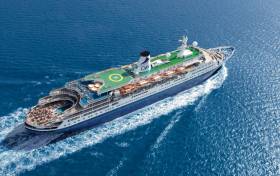Displaying items by tag: Classic Marco Polo
Classic Liner to Cruiseship Calls to Capital
#ClassicLiner – A classic liner built for the Soviets more than 50 years ago that became a cruiseship sailing the seven seas and to both poles, called to Dublin Port today, writes Jehan Ashmore.
Marco Polo which is home-ported in London (Tilbury), is a classic ship steeped in maritime tradition and in which operators, Cruise & Maritime Voyages have a loyal following on this traditional ship.
The ocean-going lady of the sea had docked at Dublin mid-morning as part of UK and Irish ports cruise. Yesterday, her passengers visited western Scotland, to Tobermory on the Isle of Mull.
Today, passengers are exploring the capital and environs before re-embarking the 22,080 tonnes veteran vessel this evening. A departure time of 2200 is scheduled for the next port of call, the Scilly Isles off Cornwall.
The cruiseship is docked at Dublin’s Ocean Pier, apt given she served as a transatlantic liner between the USSR and Canada as the Alexandr Pushkin. The second of a quartet of the ‘poet’ class sisters was named after Russia’s greatest poets and writers. She was built in 1965 at the Mathias-Thesen Werft in Wismar, in the former East Germany.
Alexandr Pushkin operated in the summer between Leningrad, Bremerhaven, London, Le Havre and Montreal, a liner service she dutifully carried out until the late seventies. During the winter she cruised in warmer climes while mostly on charter to western companies.
The 800 capacity cruiseship was extensively re-built in 1993 and still retains classic lines, where tiered sun decks featuring a swimming pool and whirlpools overlook a cruiser stern. More unusual are the open decks below the bridge and overlooking the bow, a feature notably absent from today's giant enclosed cruiseships.





























































